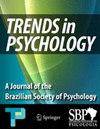Love and Relationship Satisfaction as a Function of Romantic Relationship Stages
Q3 Psychology
引用次数: 0
Abstract
Abstract The strong influence of the components of love in the relationship satisfaction is very described in the scientific literature. The current cross-sectional study evaluated the associations between participants’ love and relationship satisfaction across different phases of a relationship. For this propose, we recruited a sample of 1102 Brazilian participants, including 756 (68.6%) women and 346 (31.4%) men (mean age = 25.52 years, SD = 7.98), from 12 Brazilian states and the Federal District. Participants’ relationship was coded in order of bond levels: 0 - unrequited relationship, 1 - non-established relationship, 2 - dating, 3 - living together or engaged, and 4 - married. A linear regression analysis indicated that the influence of passion on relationship satisfaction is higher, and the influence of commitment is lower, in more advanced phases of one’s relationship. Multilevel regression showed the role of bond, interacting with the dimensions of love on the prediction of relationship satisfaction. The associations between types of love and relationship satisfaction differ across relationship stages. While the influence of passion and intimacy on relationship satisfaction grows across the relationships’ stages, the influence of commitment decreases. This study also suggests that type of relationship can be understood as an ordinal variable, instead of categorical.爱情和关系满意度作为浪漫关系阶段的函数
科学文献对爱情成分对关系满意度的强烈影响有很好的描述。目前的横断面研究评估了在一段关系的不同阶段参与者的爱和关系满意度之间的联系。为此,我们从巴西12个州和联邦区招募了1102名巴西参与者,其中包括756名(68.6%)女性和346名(31.4%)男性(平均年龄= 25.52岁,SD = 7.98)。参与者的关系按照关系等级进行编码:0 -单恋,1 -未建立关系,2 -约会,3 -同居或订婚,4 -结婚。线性回归分析表明,激情对关系满意度的影响越大,承诺对关系满意度的影响越小。多水平回归分析显示,联结与爱的维度对关系满意度的预测有交互作用。爱的类型和关系满意度之间的联系在关系的不同阶段有所不同。虽然激情和亲密对关系满意度的影响在关系的各个阶段都在增长,但承诺的影响却在下降。本研究还表明,关系类型可以理解为一个顺序变量,而不是分类变量。
本文章由计算机程序翻译,如有差异,请以英文原文为准。
求助全文
约1分钟内获得全文
求助全文
来源期刊

Trends in Psychology
Psychology-Psychology (all)
CiteScore
2.20
自引率
0.00%
发文量
121
审稿时长
48 weeks
期刊介绍:
Trends in Psychology is a quarterly publication of the Brazilian Society of Psychology. It is intended to disseminate original scientific work in all fields of psychology, such as empirical, historical, theoretical and conceptual studies, as well as reviews of literature.
 求助内容:
求助内容: 应助结果提醒方式:
应助结果提醒方式:


